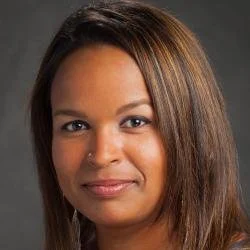A great number of academic and industry initiatives seek to mitigate what are increasingly understood as ethical concerns in the development, implementation, and evaluation of algorithms in social contexts. Often, when confronted with questions of ethics within these socio-technical systems, engineers ,data scientists, and others turn to the field of Philosophy for help in trying to decide the balance between the right thing to do and what we can do. In this talk, Dr. Rodriguez presents her arguments for why most strands of moral philosophy are ill equipped to help us deal with the realities of algorithmic bias. Her arguments use evidence gleaned from years of professional experience in human services, her study of moral philosophy, as well as arguments put forth by a school of Black Philosophers. The aim of the talk is to introduce the audience to more contextual forms of philosophizing, ones grounded in the realities of marginalized existence.
Dr. Rodriguez is an Assistant Professor at the University at Buffalo's School of Social Work (SUNY). She is also a faculty associate at the BerkmanKlein Center for Internet and Society, a faculty fellow at the Center for Democracy and Technology, and a member of the Twitter Academic Research Advisory Board. Her research is at the intersection of applied demography, computational social science, and social policy. The first line of research examines the ethical implications of algorithmic decision-making in human services, child welfare in particular. The second line of research looks at the lived experience of marginalized communities as self-reported on social media. The through line between the two concerns the methods involved: she identifies as a methodologist in social work spaces, in as far as her substantive focus is how computational methods can support using large, unstructured data to scale social work interventions. For that reason Rodriguez founded the caretLAB, the first lab housed in a school of social work to her knowledge dedicated to computational research methods in the public interest. Her lab works with technologists across fields of inquiry to leverage cutting edge, innovative technologies to develop, implement, and evaluate scaled interventions.

